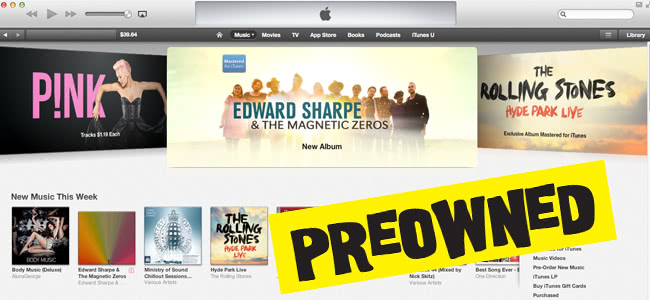A proposal to shape laws to allow for the resale of digital music has been slammed by the Australian Independent Record Labels Association (AIR), as News Ltd reports, saying that the recommendation to implement the legal resale of mp3s and digital collection is impractical and could hurt artists.
The recommendation comes from the results of the Federal Parliament’s year-long inquiry into IT pricing after finding that Australian consumers paid up to 52% more for music on digital platforms such as iTunes. The Parliament’s final 150 page report suggests a number of amendments to laws to solve the problem, including that “the government establish a legally protected right of resale for digital content.”
But indie label representative AIR calls the proposal damaging to artists who sell up to 50% of all their music through online distribution, adding the Parliament’s recommendation of digital resale “undermines the ability for creators to control their own rights and is completely impracticable and unmanageable.”
“At this point AIR is absolutely against it,” said AIR General Manager Nick O’Byrne, arguing that digital music doesn’t depreciate in quality the way that physical products too and thus the resale of mp3s is essentially selling a brand new product at a second hand price, creating a secondary market that undercuts the original music-makers and content providers.“Any resale scheme is unlikely to include provisions for the payment of royalties to the rights holders…” AIR General Manager Nick O’Byrne
“Any resale scheme is unlikely to include provisions for the payment of royalties to the rights holders,” says Mr O’Byrne; “even if it did I can’t imagine how it would be enforced. Given that there are an increasing number of industry endorsed platforms for consuming music (Spotify, YouTube, Rdio, iTunes, Bandcamp) which cost very little, I don’t see how a resale market for digital music would be attractive for consumers.”
But Nick Champion, who chaired the Federal Government’s IT Pricing Inquiry disagrees, saying that even if industry and labels are against the resale of digital music, “(that) doesn’t mean that it’s not in the interests of consumers or the public good… we’re seeking to balance the interests of consumers and content providers.”
A recent survey of UK and US consumers conducted by WorldPay echoes those sentiments, showing that more than half of those surveyed would like to have the option of selling-on digital content they’ve purchased, with a smaller proportion believing it was their right to do so.
Love The Beatles?
Get the latest The Beatles news, features, updates and giveaways straight to your inbox Learn more
Despite the growth of consumer interest in creating a legal secondhand market for digital music, there remains the looming elephant in the room: music piracy. The lines between a legal system for reselling mp3s and simply breaching copyright to duplicate multiple files for sale becomes extremely blurred. Rights holders, such as musicians and record representatives like AIR, are concerned that by allowing a legal resale market it will simply provide a cover for illegal filesharers to operate, and worse still profit from.
It was an issue that was at the centre of court case between Capitol Records and online company Re-Digi, which offers the buy and selling of ‘pre-owned’ music direct from one user to another. The service works by letting iTunes users select tracks in their library for re-sale, Re-Digi verifies the track, places it into a cloud-based storage system then deletes the original file from the user’s computer. Even if industry and labels are against the resale of digital music, “(that) doesn’t mean that it’s not in the interests of consumers.”
From there other Re-Digi customers can then purchase the cloud-based file, transferring the ownership of the mp3 to the new customer while the old version is deleted. But the system – while well-meaning – has some obvious, vulnerable loopholes which meant that Re-Digi lost the lawsuit filed by Capitol on the basis of copyright infringement.
Capitol claimed that songs by artists on its roster – including The Beatles, Beastie Boys, and Coldplay – were being illegally reproduced through streaming previews for items sold on Re-Digi. US District Judge Richard Sullivan ruled that the music website’s service “infringes Capitol’s reproduction rights under any description of technology,” stating it was clear that ReDigi was facilitating and profiting from the sale of the copyrighted commercial recordings.
The muddy issue of digital ownership and copyright is likely to grow more problematic as digital music sets to become the dominant mode of distribution, with a recent industry report projecting that by 2016 digital music will overtake physical.
A dramatic shift that’s come as a result of the growing popularity of music streaming services, which are taking a huge bite out of Apple’s iTunes profits as more users move to cheaper subscription based models provided by the likes of Spotify, Deezer, and internet radio service Pandora.
“We are starting to see listeners move from music ownership to a rental or lease model,” said Pandora Australia Managing Director Jane Huxley recently, echoing statements by VEVO’s CEO saying the future of music was “access not ownership”, and Deezer’s CEO calling out the “end of music downloads.”
But as the very public debate between Spotify and Atoms For Peace’s Nigel Godrich and Thom Yorke demonstrated, the issue remains how the artists will actually benefit and flourish from the low royalty scheme rates offered by most streaming services.




































